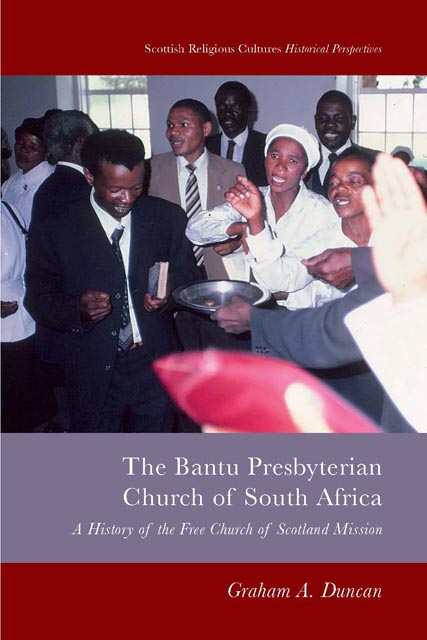Book contents
- Frontmatter
- Contents
- Acknowledgements
- Timeline
- A Presbyterian Anthem
- Introduction
- 1 Background to this Study
- 2 The Origins and Early Development of Scottish Presbyterian Mission in South Africa, 1824–65
- 3 Rev. Tiyo Soga (1829–71): A Paragon of Early Indigenous Leadership
- 4 The Role of Mission Councils in the Scottish Mission in South Africa, 1864–1923
- 5 The Rev. Edward Tsewu’s Dispute with the Free Church of Scotland Mission
- 6 The Mzimba Secession, 1898: A South African ‘Disruption’
- 7 Presbyterianism in South Africa, 1897–1923: To Unite orNot to Unite?
- 8 Preparations for the Formation of the Bantu Presbyterian Church of South Africa, 1897–1919
- 9 The Formation of the Bantu Presbyterian Church of South Africa, 1920–3
- 10 Mission to Church – Church to Mission: The First Ten Years, 1923–33
- 11 Reaching Out: The Bantu Presbyterian Church in South Africa and the Presbyterian Church of South Africa and Ecumenism, 1923–39
- 12 The Bantu Presbyterian Church in South Africa and Ecumenism, 1940–99
- 13 The End of Mission Councils: The Church of Scotland South Africa Joint Council, 1971–81
- 14 A Young Church in Mission or Maintenance Mode?: The Bantu Presbyterian Church of South Africa, 1923–99
- 15 The Bantu/Reformed Presbyterian Church and Socio-political Issues
- 16 Bantu/Reformed Presbyterian ChurchWomen in Leadership in Ministry
- Conclusion: Indigenous Presbyterians and Missionaries –Transferring Contending Roles and Responsibilities
- Bibliography
- Index
2 - The Origins and Early Development of Scottish Presbyterian Mission in South Africa, 1824–65
Published online by Cambridge University Press: 26 November 2022
- Frontmatter
- Contents
- Acknowledgements
- Timeline
- A Presbyterian Anthem
- Introduction
- 1 Background to this Study
- 2 The Origins and Early Development of Scottish Presbyterian Mission in South Africa, 1824–65
- 3 Rev. Tiyo Soga (1829–71): A Paragon of Early Indigenous Leadership
- 4 The Role of Mission Councils in the Scottish Mission in South Africa, 1864–1923
- 5 The Rev. Edward Tsewu’s Dispute with the Free Church of Scotland Mission
- 6 The Mzimba Secession, 1898: A South African ‘Disruption’
- 7 Presbyterianism in South Africa, 1897–1923: To Unite orNot to Unite?
- 8 Preparations for the Formation of the Bantu Presbyterian Church of South Africa, 1897–1919
- 9 The Formation of the Bantu Presbyterian Church of South Africa, 1920–3
- 10 Mission to Church – Church to Mission: The First Ten Years, 1923–33
- 11 Reaching Out: The Bantu Presbyterian Church in South Africa and the Presbyterian Church of South Africa and Ecumenism, 1923–39
- 12 The Bantu Presbyterian Church in South Africa and Ecumenism, 1940–99
- 13 The End of Mission Councils: The Church of Scotland South Africa Joint Council, 1971–81
- 14 A Young Church in Mission or Maintenance Mode?: The Bantu Presbyterian Church of South Africa, 1923–99
- 15 The Bantu/Reformed Presbyterian Church and Socio-political Issues
- 16 Bantu/Reformed Presbyterian ChurchWomen in Leadership in Ministry
- Conclusion: Indigenous Presbyterians and Missionaries –Transferring Contending Roles and Responsibilities
- Bibliography
- Index
Summary
The Context
The South African context in which mission work developed, first in the Eastern Cape, was in the creation of a settler community where the indigenous peoples were forced to move eastwards and northwards to allow for the land needs of the settlers. These settlers were encroaching on land traditionally occupied by various ethnic groups and helped to create neutral territory between the Fish and Keiskamma Rivers between 1829 and 1835. This brought about a resistance movement often called the Wars of Dispossession which lasted for almost 100 years (1779–1889). This, along with the cattle-killing disaster of 1856–7, resulted in the destabilisation of the Eastern Cape for much of the nineteenth century (Cory MS 7514n). The authority of the chiefs was undermined if not destroyed and the change, allied to the diminution of chiefs’ role in the allocation of land, produced a volatile situation in which missionaries sought to do their work in destabilised African societies. The main area affected was the Eastern Cape which was under pressure from the encroachments of white settlers expanding their territory eastwards from the Western Cape and from Algoa Bay, particularly following the arrival of the 1820 settlers. This was expressed in wars against the colonial authorities and accommodation with Christianity.
The African context of the Eastern Cape, in particular, was dynamic as it had for some time been accommodating itself to an ever-enlarging global domain through the intrusion of both British and African communities. It had incorporated the refugees from the early nineteenth century Mfecane (forced migration), the amaMfengu and the amaGqunukhwebe who became intermediaries and emissaries of the novel western symbolic universe or worldview as it was established. Lovedale Institution was one such site where the amaMfengu were settled and impacted on the new worldview. Despite this the amaXhosa inhabited a hitherto relatively static world where strangers and aliens were incorporated into a stable community. With the coming of white missionaries, settlers and colonialists, proselytisation became evident within the traditional African worldview helping to deny the validity of the new rival universe by promoting the values of the intruding dominant and dominating European colonial worldview (Berger & Luckman 1967: 130).
- Type
- Chapter
- Information
- Bantu Presbyterian Church of South AfricaA History of the Free Church of Scotland Mission, pp. 18 - 29Publisher: Edinburgh University PressPrint publication year: 2022



